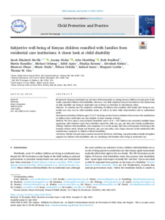Background: Living in residential care has been well documented as causing harm to children in some parts of the world, especially children with disabilities. However, very little empirical research has looked at the intersection of child disability and living in residential care in Kenya or elsewhere in Sub-Saharan Africa.
Objective: To examine how the subjective well-being of children who reunified with family after living in residential care may vary by child disability status, as well as by other child characteristics such as orphanhood status.
Participants and Setting: Children aged 11 to 17 receiving services from an initiative that oversaw the reunification of children from residential care into families in three counties in Kenya.
Methods: We drew upon a cross-sectional household survey of N = 105 children and conducted multiple linear regressions with clustered errors that controlled for child sex, age, and time since family reunification.
Findings: Children with disabilities, who comprised 13% of the sample, had lower self-reported well-being in the domains of basic needs, leisure and freedom, and care and safety, and a larger decrease in life satisfaction after reunification, compared to children without disabilities.
Conclusion: Further research must examine reasons for this lower well-being, and policymakers should strengthen supports for children with disabilities who are reunifying with families after living in residential care.

